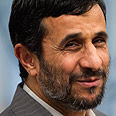
Envoys: Turkey, Brazil brokering Iran nuclear deal
UN diplomats say China, Russia ready to give Brazilians, Turks time they need to revive stalled atomic fuel deal with Tehran in bid to help Islamic Republic avoid new sanctions over its nuclear program. Developments will likely delay UN sanctions vote until June
Turkey and Brazil are trying to revive a stalled atomic fuel deal with Iran in an attempt to help the Islamic Republic avoid new United Nations sanctions over its nuclear program, Western diplomats said on Friday.
China and Russia – which reluctantly joined the United States, Britain, France and Germany in negotiating a draft resolution that would impose a fourth round of UN sanctions on Tehran – are ready to give the Brazilians and Turks the time they need to broker a deal, UN diplomats said.
Western diplomats made clear they were not happy about a development that will likely delay a UN sanctions vote in New York. Washington had hoped to have a final draft ready ahead of a May 3-28 meeting on the nuclear Non-Proliferation Treaty, but diplomats say negotiations could run into June at least.
Speaking on condition of anonymity, the diplomats said that nonpermanent Security Council members Brazil and Turkey had helped broker an Iranian counteroffer to a UN proposal to enable Iran to refuel an aging research reactor in Tehran that makes isotopes for cancer treatment.
Under the original offer, Iran would have sent most of its enriched uranium stocks out of the country for up to year for further enrichment and processing in Russia and France. After agreeing in principle in October, Tehran balked at the offer.
Iranian Foreign Minister Manouchehr Mottaki presented the Iranian counterproposal, which Western diplomats said was unlikely to be acceptable to them, during a meeting on Sunday with U.N. nuclear watchdog chief Yukiya Amano.
Brazil and Turkey have already expressed their willingness to mediate in the standoff between Iran and the West over its nuclear program. It was not immediately clear how long Russia and China were willing to give the two countries to revive the nuclear fuel deal.
The United States, European Union and their allies suspect Iran is covertly developing the capability to produce bombs.
Waning significance
Western envoys were skeptical but made clear they would not oppose Russia and China.
"Nobody's going to stand in the way of serious negotiations," a Western diplomat told Reuters. "But is Iran serious about this offer? Or is it another attempt to stall for time and avoid sanctions, as has been the case before?"
UN diplomats said that the nuclear fuel deal was only one of many issues with Iran, which is under a series of prior UN sanctions, they said, for refusing to halt uranium enrichment.
They added that the significance of the fuel offer was waning with each passing day as the Iranians continue to enrich uranium and expand their stocks.
The Turks and Brazilians have said they would have trouble supporting a new sanctions resolution against Tehran, which insists its nuclear program is entirely peaceful and intended solely for generating electricity.
But one diplomat said that if the Turkish and Brazilian initiative failed, they might vote in favor of sanctions. Council resolutions need nine votes in favor and no vetos from the five permanent members to pass.
Brazilian President Luiz Inacio Lula da Silva is due to visit Tehran in May, reflecting the countries' growing diplomatic and economic ties.
U.N. ambassadors from the five permanent Security Council members and Germany have been meeting regularly in New York to reach a deal on a draft resolution for the full council.
But diplomats say that the six powers are far from in agreement as Russia and China push to dilute the punitive measures in a US-drafted sanctions proposal. Russian and Chinese diplomats are negotiating "line-by-line" and checking with their finance ministries on every detail, an envoy said.
Among the sticking points in the draft is a call for an arms embargo with an international inspection regime similar to one in place against North Korea. Both China and Russia have problems with the proposed arms embargo, diplomats say.
The US envoy to the United Nations, Susan Rice, said on Friday that the United States and its allies will work "as long as it takes" to get a sanctions resolution.










